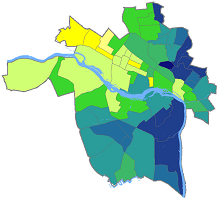Sign up for the monthly RVAgreen 2050 newsletter here.
Call us at (804) 646-6957
Email us at rvagreen@rva.gov
What is RVAgreen 2050?

RVAgreen 2050 is the City of Richmond’s equity-centered climate action and resilience planning initiative to reduce greenhouse gas emissions 45% by 2030, achieve net zero greenhouse gas emissions by 2050 and help the community adapt to Richmond’s climate impacts of extreme heat, precipitation, and flooding. This community-wide initiative to develop and implement a roadmap of actions is using an innovative planning approach that centers frontline community members and works at the intersection of equity, mitigation, and climate resilience. RVAgreen 2050 is equitable climate action for a healthy and resilient Richmond.
Climate Action
A key piece of RVAgreen 2050 is climate action, the reduction of greenhouse gas (GHG) emissions that contribute to global warming, also known as climate change mitigation. Mitigation actions focus on slowing and reducing the magnitude of changes in the climate.

Climate Resilience
Another key piece of RVAgreen 2050 is climate change adaptation, also referred to as resilience, preparedness and readiness. Richmond is conducting adaptation planning to identify and implement actions that reduce community vulnerability to the impacts of climate change. This will help our community adapt to changes in the environment and future changes in sea level.

Climate Equity
Climate change affects some members of our community more than others. Individuals in poverty have fewer resources and receive less support, which reduces their ability to prevent, cope with, and adapt to climate change impacts. Climate change impacts increase the vulnerability of individuals below the poverty level, causing a rise in risks such as physical and mental illnesses, job loss, and decreased food security.
In addition, due to historic and institutional racism, people of color are more likely to live in more marginal and exposed areas that are more susceptible to climate impacts. For these reasons, it is critical that the City of Richmond’s efforts to address climate change are carried out in a way that is inclusive of and protects our most vulnerable communities.

Centering Equity
What does equity mean for RVAgreen 2050? We will address equity through the following framework:
 Source: Government Alliance on Race and Equity; Desiree Williams-Rajee, Kapwa Consulting (modified)
Source: Government Alliance on Race and Equity; Desiree Williams-Rajee, Kapwa Consulting (modified)
Climate Equity Index
 As an input to the RVAgreen 2050 planning process, the City of Richmond conducted an assessment of the vulnerability of Richmond’s residents, built assets, and natural resources to the climate impacts of extreme heat, extreme precipitation, and future sea level rise. Climate change affects some members of our community more than others based on several root causes and social and biological factors, many of which can be explored using this tool. This Climate Equity Index is being used to identify and engage Richmond’s frontline communities.
As an input to the RVAgreen 2050 planning process, the City of Richmond conducted an assessment of the vulnerability of Richmond’s residents, built assets, and natural resources to the climate impacts of extreme heat, extreme precipitation, and future sea level rise. Climate change affects some members of our community more than others based on several root causes and social and biological factors, many of which can be explored using this tool. This Climate Equity Index is being used to identify and engage Richmond’s frontline communities.
Climate & Health
Climate change will affect, and already is affecting, human physical and mental health. The climate impacts affecting Richmond - extreme heat, extreme precipitation, and future impacts of sea level rise - will cause new health problems and worsen existing ones. Health threats could include extreme heat, poor air quality and changes in bacteria, viruses and other infectious agents. Extreme events, such as heavy rainfall, can also disrupt critical services such as healthcare and public safety.
Climate-related health stressors will impact some members of our community more than others. This is because various factors can cause some people to have increased sensitivity to climate change. For example, people living in urban areas with less green space and tree canopy may be exposed to higher temperatures because of the urban heat island effect. In addition, people with preexisting health conditions such as cardiovascular and respiratory illnesses may be more at risk of heat-related illness. For these reasons, it is critical that the City of Richmond’s efforts to address climate change are carried out in a way that is inclusive of and protects our most vulnerable communities.

Source: Climate Change and Health, Fourth National Climate Assessment









